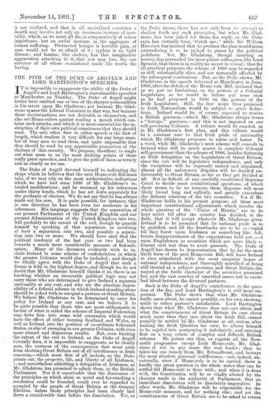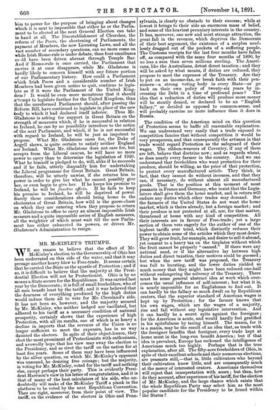THE PITH OF THE DUKE OF ARGYLL'S AND LORD HARTINGTON'S
SPEECHES.
IT is impossible to exaggerate the ability of the Duke of Argyll's and Lord Hartington's statesmanlike speeches at Manchester on Tuesday. The Duke of Argyll might better have omitted one or two of the sharper personalities in his retort upon Mr. Gladstone, not because Mr. Glad- stone spares the Liberal Unionists in that way, but because these recriminations are not desirable in themselves, and also set Home-rulers against reading a speech which con- tains such attacks, and which it is most essential for the in- struction of their own political consciences that they should read. The only other flaw in either speech is the flaw of length, which renders it very difficult for any large num- ber of busy men to read them, and quite impossible that they should be read by any appreciable proportion of the electors of this country. We propose, therefore, to single out what seem to us the most striking points of these really great speeches, and to give the pith of them as tersely and as clearly as we can.
The Duke of Argyll devoted himself to indicating the shape which he believes that the next Home-rule Bill must take, if we may rely on the most authoritative indications which we have had since 1886 of Mr. Gladstone's in- tended modifications ; and he summed up his inferences under thirty heads, which he has set down separately for the guidance of electors. We do not say that he has always made out his case. It is quite possible, for instance, that in one direction he has been even too moderate in his inferences. His language suggests that the separation of our present Parliament of the United Kingdom and our present Administration of the United Kingdom into two, will probably be the extent of the evil, though he guards himself by speaking of that separation as involving at least a separation into two, and possibly a separa- tion. into two or more. We should have said that the political tendency of the last year or two had been towards a much more considerable measure of federali- sation. Many of the dreamers evidently wish to in- clude Ireland. in some scheme of confederation in which the greater Colonies would also be included ; and though we wholly agree with the Duke of Argyll that such a dream is wild in the highest degree, and though we do not doubt that Mr. Gladstone himself thinks it so, there is no knowing whither an inexorable political logic may not carry those who are determined to give Ireland a separate nationality at any cost, and who see the absolute impos- sibility of a federal scheme in which Ireland standing alone should be yoked with so unequal a partner as Great Britain. We believe Mr. Gladstone to be determined to carry his policy for Ireland at any cost, and we believe it to be quite possible that those who are most enthusiastic in favour of what is called the scheme of Imperial Federation may drive him into some wild concession which would have the effect of either turning Scotland and Wales, as well as Ireland, into the position of co-ordinate federated States, or else of sweeping in our greater Colonies, with even more absurd and disastrous results. But, even limiting the extent of the evil to Ireland, as the Duke of Argyll virtually does, it is impossible to exaggerate, as he clearly sees, the vastness of the consequences that must arise from shutting Great Britain out of all interference in Irish concerns,—which must first of all include, as the Duke points out, the property, life, and liberty of all Irishmen, —and nevertheless admitting a delegation of Irishmen, as Mr. Gladstone has promised to admit them, to the British Parliament. Nor is it conceivable that the discussion of the principles on which alone so novel and far-reaching a revolution could be founded, could ever be regarded as accepted by the people of Great Britain at the General Election, unless those principles had been clearly laid down a considerable time before the dissolution. Yet, as the Duke shows, there has not only been no attempt to shadow forth any such principles, but when Mr. Glad- stone has been asked for them, his reply, as the Duke says, has virtually been, Catch me ; ' while Sir William Harcourt has insisted that to produce the plan would mean surrendering it to be picked to pieces by the political jackdaws. Yet, Mr. Gladstone, though insisting on secrecy, has persuaded his more pliant colleagues, like Lord Spencer, that there is in reality no secret to reveal ; that for all practical purposes the scheme of 1886 may be regarded as still substantially alive, and not materially affected by the subsequent concessions. But, as the Duke shows, Mr.
Gladstone, in the speech delivered at Manchester in June, 1886, after the defeat of the Home-rule Bill, declared that as we put no limitations on the powers of a Colonial Legislature, so he would in future put none such as he had proposed in 1886 on the powers of the Irish Legislature. Still, the free scope thus promised to Irish Nationalism would be subject to grave deduc- tions. Ireland would be, of course, expected to receive a British garrison,—which Mr. Gladstone always terms a " foreign " garrison,—and this is not imposed on our self-governing Colonies. A tribute would be exacted, as in Mr. Gladstone's first plan, and this tribute would be a constant sore to that Irish pride of nationality which Mr. Gladstone proposes to nurse and foster. In a word, while Mr. Gladstone's next scheme will concede to Ireland what will be much nearer to complete Colonial self-government than the scheme of 1886, besides fastening an Irish delegation on the Legislature of Great Britain, since the rule will be legislative independence, and only the exceptions will be expressly named and stipulated, almost all the unforeseen disputes will be decided un- favourably to Great Britain, so far as they get decided at all. But in default of any carefully constituted Supreme Court to decide moot constitutional questions, of which there seems to be no rumour, these disputes will most likely brood long and sullenly, and greatly exacerbate the delicate relations of the two countries. Yet if Mr. Gladstone holds to his present purpose, all those most important constitutional adjustments which involve the whole question of the " Union of Hearts," are to be kept secret till after the country has decided, in the dark, that it will accept whatever Mr. Gladstone gives. Ireland is to be promised that its national pride is to be gratified, and all the drawbacks are to be concealed till they burst upon Irishmen as something like deli- berate disappointments of the expectations held out, and upon Englishmen as securities which are more likely to foment civil war than to avert quarrels. The Duke of Argyll has shown to demonstration that by far the most likely form of the next Home-rule Bill, will leave Ireland at once stimulated with the most sanguine hopes of national independence, and thoroughly mortified at being still treated as a subject province, and Great Britain dis- mayed at the futile character of the securities promised her, and the vast number of unsettled issues left to excite bad blood between the divorced partners.
Such is the Duke of Argyll's contribution to the ques- tion of the day, and Lord Hartington's is still more im- portant. The Duke shows that what Mr. Gladstone really cares about, he cannot possibly, on his own showing, settle to either partner's satisfaction. Lord Hartington shows that what Mr. Gladstone does not care about, and what the constituencies of Great Britain do care about much more than they care about the Irish Bill, cannot possibly be settled by Mr. Gladstone at all, unless, after making the Irish Question his own, he allows himself to be cajoled into postponing it indefinitely, and entering first on a long course of complex and difficult British reforms. He points out that, as regards all the New- castle programme except Irish Home-rule, Mr. Glad- stone is not in any sense the real leader ; that he takes his cue tamely from Mr. Schnadhorst, and betrays the most absolute personal indifference,—not, indeed, un- naturally, since if Home-rule is to be carried, there is hardly one great question in the whole series that can be settled till Home-rule is done with ; and when it is done with, the Constitution will be so vitally altered by the changes made in the authority of Parliament, that an immediate dissolution will be absolutely imperative. In other words, Mr. Gladstone will be responsible for the Home-rule measure, and for nothing else ; and yet the constituencies of Great Britain are to be asked to return him to power for the purpose of bringing about changes which it is next to impossible that either he or the Parlia- ment to be elected at the next General Election can take in hand at all. The Disestablishment of Churches, the reform of the Peers, the shortening of Parliaments, the payment of Members, the new Licensing Laws, and all the vast number of secondary questions, can no more come on while Irish Home-rule is under debate, than four omnibuses co ild have been driven abreast through Temple Bar. And if Home-rule is once carried, the Parliament that carries it at once disappears, while Mr. Gladstone is hardly likely to concern himself with any future portion of our Parliamentary history. How could a Parliament which Irish Peers and a considerable number of Irish Members had been given notice to quit, continue to legis- late as if it were the Parliament of the United King- dom ? It would be even more monstrous that it should a'tempt to legislate further for the United Kingdom, than that the unreformed Parliament should, after passing the Reform Bill, have continued to legislate in place of the new body to which it had declared itself inferior. Thus Mr. Gladstone is asking for support in Great Britain on the strength of measures which, if he is successful in relation to Ireland, he can by no possibility introduce to the notice of the next Parliament, and which, if he is not successful with regard to Ireland, he will be just as impotent to propose. What Mr. Gladstone cares for, the Duke of Argyll shows, is quite certain to satisfy neither England nor Ireland. What Mr. Gladstone does not care for, but accepts from the Liberal caucus, he will have no more power to carry than to determine the legislation of 1920. What he himself is pledged to do, will, alike if he succeeds and if he fails, utterly disqualify him for undertaking the Liberal programme for Great Britain. Great Britain, therefore, will be utterly unwise, if she returns him to power in order to give her what he cannot possibly give her, or even begin to give her. If he keeps his promise to Ireland, he will be functus officio. If he fails to keep his promise to Ireland, he will be deprived of power. Surely these considerations should bring home to the electorates of Great Britain, how wild is the goose-chase on which they are entering when they propose to return Mr. Gladstone to office to carry an almost impossible Irish measure and a quite impossible series of English measures, all the weightier of which must wait till the new Parlia- ment has either exhausted its powers, or driven Mr. Gladstone's Administration to resign.







































 Previous page
Previous page